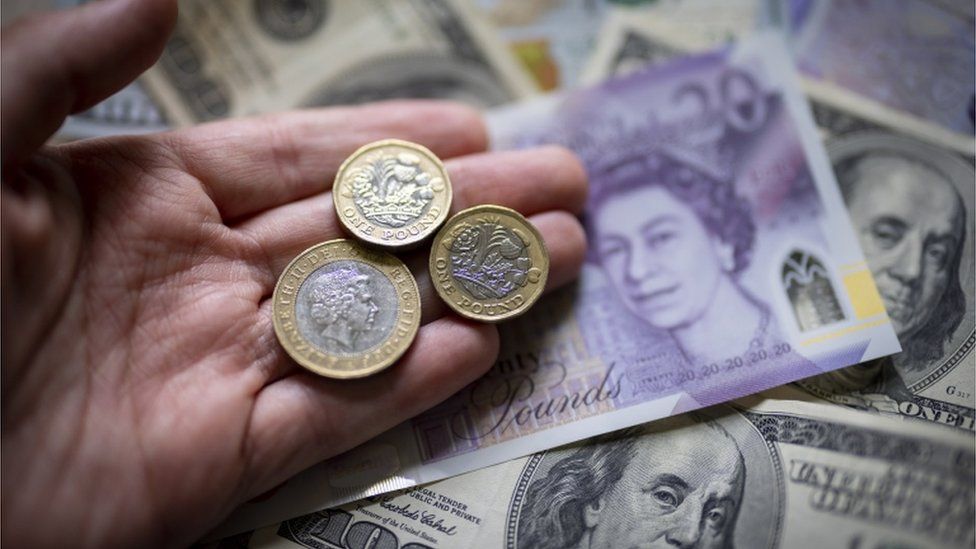Conservative MPs concerned at market reaction to tax cuts
- Published

Some Conservative MPs have expressed concern about the government's economic approach, after its tax cutting plans sparked market turmoil.
A package of tax cuts announced last week, funded by public borrowing, has seen the pound fall to record lows against the US dollar.
Some Conservatives have told the BBC they are worried the reaction could harm their party's economic reputation.
Ministers have insisted their approach will boost the flagging UK economy.
Chancellor Kwasi Kwarteng has defended the cuts, insisting the tax burden under previous Conservative governments had been holding back growth.
The cuts announced by Mr Kwarteng on Friday, including to income tax and the stamp duty on home purchases, are the biggest package of tax cuts in 50 years.
April's rise in National Insurance will also be reversed in November, whilst planned rises in business taxes next year have also been scrapped.
The cuts have prompted market unease at the sharp increase in government borrowing required to fund them, and criticism from opposition parties.
Some Conservative MPs have also expressed concern.
One former cabinet minister said: "If he has provoked a crisis within his first weeks in office, it's not great."
One well-connected MP warned the radical economic strategy may have come too soon - and Tory MPs will turn on the leadership if interest rates rocket and inflation runs out of control.
Two Tory MPs used the same analogy to describe the Chancellor's strategy, saying he had "put it all on red". While they were nervous about the plan, they said they hoped it would work out.
The mantle of economic credibility is one of the biggest prizes in politics; a near obligatory ticket required to win a general election, says Chris Mason.
A double dose of attempted reassurance from the Treasury and the Bank of England on Monday had a clear thrust: don't panic, we know what we are doing. But plenty of Tory MPs fear that they don't, and they fear all this could mug their party of its economic reputation never for it to properly return.
The BBC's political editor says one senior Conservative figure said they were "very concerned" - and particularly about the additional cost of government borrowing.
They added that there was a "spectrum" of potential outcomes, ranging from "Liz Truss getting lucky, things ease on the markets, the economy grows" all the way along to "all the wheels come off, there's a run on the pound, a debt crisis and the UK is forced to go to the IMF".
So where on the spectrum did this MP think things might end up? "Nearer to the bad end of things," they suggested.
And some MPs are even discussing rumours of letters to the 1922 committee (always treat these rumours with a pinch of salt, they are always swirling).
But many who are privately concerned are not rushing to publicly denounce the Growth Plan.
An MP who supported Rishi Sunak in the leadership contest said, that among other reasons, they didn't want to be dismissed as sore losers.
And concern in the party is not universal - with others arguing the chancellor is right to try and ride market fluctuations.
For many who are sceptical about the strategy, the mini-budget did contain things they liked, such as the plans to speed up infrastructure projects.
One MP elected in 2019 said she was "optimistic" about some of the productivity measures, which she described as "very positive".
Speaking to BBC Radio 4 earlier on Monday, Tory MP Danny Kruger said the market reaction needed to be taken seriously, but he thought it would settle.
He said the approach of previous Tory governments had been of "managed decline", and the chancellor's cuts were a "bold set of reforms that will drive investment and liberate enterprise".
"Once we see the splash of last Friday's announcement subside, we will see real value has been created for our economy and markets will respond."
Lord David Frost, Conservative peer and former chief Brexit negotiator, called the market turmoil "unwarranted" and "an overreaction".
He said interest rates would have to go up to help control inflation, which has reached its highest point in 40 years.
In an effort to calm markets, the Treasury announced on Monday that Mr Kwarteng will set out more detail of the government's approach to balancing spending on 23 November.
The Bank of England also said it would "not hesitate" to hike interest rates to curb inflation if required.
The government has promised further announcements in the coming weeks aimed at helping economic growth - including changes to planning rules, financial services regulation and immigration policy.
But irrespective of instinct, there isn't a single Conservative MP who won't be mighty relieved if the turbulence in the markets eases and quickly.
Related Topics
- Published26 September 2022